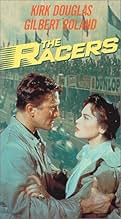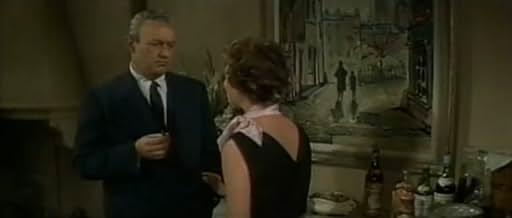Follows the professional and personal life of race car driver Gino Borgesa (Douglas), as he struggles on the track and in his love life.Follows the professional and personal life of race car driver Gino Borgesa (Douglas), as he struggles on the track and in his love life.Follows the professional and personal life of race car driver Gino Borgesa (Douglas), as he struggles on the track and in his love life.
- Mechanic
- (uncredited)
- Janka
- (uncredited)
- Doorman
- (uncredited)
- Intern
- (uncredited)
- Race Official
- (uncredited)
- Gatti
- (uncredited)
- Director
- Writers
- All cast & crew
- Production, box office & more at IMDbPro
Storyline
Did you know
- TriviaThird and final of Bella Darvi's Hollywood films, after which she continued her career in Europe.
- GoofsOn the starting grid at the Nurburgring, one of the drivers looks to his left and waves at someone in the pits. The Pit area at the Nurburgring is on drivers' right.
- Quotes
Opening Narrator: The playground of the world, Monte Carlo, is calling. The city of white villas, of sand and sea and gambling. This is how it looks once a year when even the roulette wheel seems to spin more slowly. This is how it looked on a Spring afternoon in the early fifties, the day before the annual race through its winding streets. As in every great sport, motor racing has its traditions and its heroes. As in bullfighting, the presence of death gives a special intensity to their lives. For these are the gods of the road, adored by millions, masters of a skill which approaches an art. Representing the great motor factories of England and the Continent, backed by an organisation of technical experts, they're the drivers of cars which are jewels of engineering perfection. But not all drivers are champions or part of the wealthy factory teams; others, with their secondhand cars and their unpaid helpers are poor - in everything but dreams of victory.
- ConnectionsFeatured in The 66th Annual Academy Awards (1994)
Forget the idiotic dialogue -- the dying "Dell'Oro" (Gilbert Roland), to Douglas: "Gino, my crankcase is leaking!" as he clutches at his crushed chest; Douglas explaining to the lovely- but-crosseyed Darvi how race drivers consider it bad luck to wish a race driver "good luck": "'Into the lion's mouth!' we say, or "I spit in your crankcase!'" Forget all that and watch Fangio, Villoresi, Farina, Moss, Peter Collins, Robert Manzon and his doomed compatriot Pierre Levegh driving in real races: Spa, Nürburgring, the Mille Miglia. Check out how Maserati redecorated their cars to look like the mythical "Aquila," or whatever the hell they were, under the stern team management of Lee J. Cobb, whose turn as Maglio makes Kirk Douglas sound like a native-born Milanese.
In a sly move (or simple accident of fate) director Hathaway created a quite believable pairing that resembled WAY more than a little Juan Fangio and his constant female companion whom the contemporary press always referred to, chastely, as his "wife" (Fangio never married, and it wasn't until 4 years after Fangio's death that author Karl Ludvigsen, in his 1999 biography "Juan Manuel Fangio: Motor Racing's Grand Master" revealed the real identity of his companion (AND his hitherto unknown son). The drivers of the time certainly knew she wasn't his wife, but that was a different, in many ways more honourable time; no driver, mechanic, or pit hanger-on would have even dreamed of going to the yellow press to spread the story for money. Those men were professionals: what Fangio did off the track was his own business. Off-soapbox. The stalwart Katy Jurado was perfectly cast as "Maria Chávez," the wife of aging race driver "Carlos Chavez," played by Cesar Romero -- better known as "The Cisco Kid," and then for his defining role as The Joker in the Adam West/Burt Ward Camp-Fest "Batman" series of the '60s -- miles better than Nicholson, not nearly as dark as Heath Ledger.
Original -- though not very -- musical score by Alex North, who had done such fantastic work scoring "Spartacus" and the Burton/Taylor "Cleopatra."
The great American drivers John Fitch and Phil Hill did the stunt driving for this -- scraping the arch at Ravenna during the Mille Miglia at speed was pretty hairy stuff (done with a longish piece of wire and some fresh plaster). The overall Tecnical Adviser was the veteran racing warhorse, the Baron Emmanuel de Graffenried, AND this movie was also an early example of the title work of the incomparable Saul Bass, who made movie titling an art form in its own right with movies like "The Man With Golden Arm," "Exodus," "West SideStory," Spartacus, and the ingenious and ground-breaking title-credit sequence at the beginning of John Frankenheimer's "Grand Prix," still the greatest fictional racing movie ever made. McQueen's "Le Mans" COULD have been, but for McQueen's unbelievable and thoroughly unlikable ego and overweening insistence on his personal version of perfectionism, which, in the end, cost David Piper his leg and cost McQueen Solar Productions. When the budget went nuts and Solar Productions couldn't finance, or even FINISH the movie, let alone distribute it, CBS/Cinema Center stepped in, prolonged the sappy, wholly superfluous, and, of course, inevitable background "love story" (people ain't going' to the movies to see a bunch of goddam cars runnin' around a track, ya know!), and I believe CBS/Cinema Center were responsible for the movie-ruining 1970s-style "Carmina Burana"-meets-French-Jazz-a-la-Michel-LeGrand soundtrack. The CARS are the soundtrack, you meatheads! Off soapbox again.
Hans Ruesch, who wrote the novel and collaborated on the screenplay, had been a race driver himself, never achieving much, but even HE must have winced at "I spit in your crankcase." Skip over the Douglas-Darvi scenes and go right to the footage -- magnificent!
- bbrown95-1
- Jan 31, 2011
- Permalink
Details
- Runtime1 hour 28 minutes
- Aspect ratio
- 2.55 : 1
Contribute to this page

































